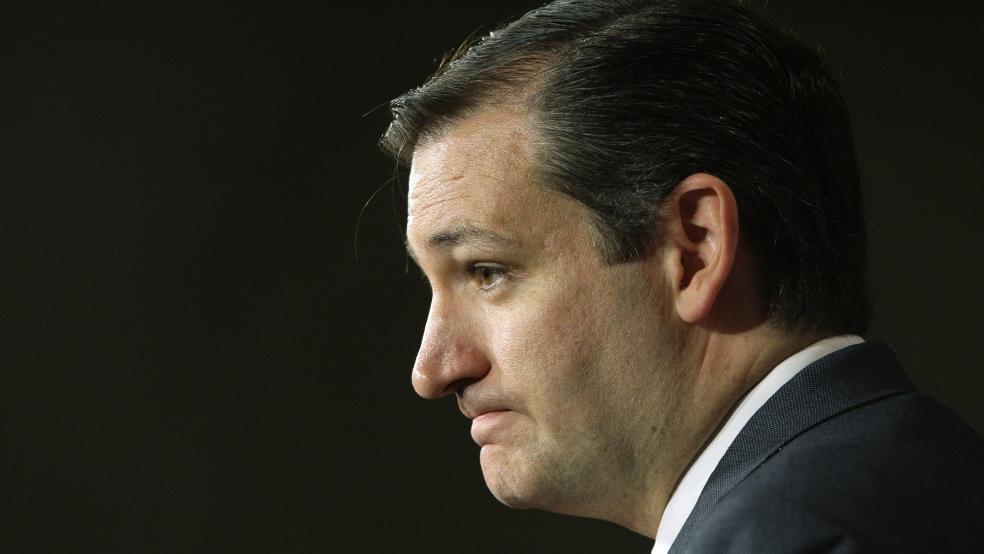House Republican leaders seem confident that on Thursday night they will pass a bipartisan budget deal worked out by Rep. Paul Ryan (R-WI) and Sen. Patty Murray (D-WA).
This is a pretty big deal on its own: Assuming the Senate clears the bill, it will be the first budget produced by Congress since 2009.
It also is widely seen as the possible beginning of a new era in Washington, not so much a Kumbaya-esque coming together of Democrats and Republicans, but an acknowledgment that Congress can't continue lurching from crisis to crisis.
For the GOP, it appears to be an admission that the Tea Party strategy of going for broke — spurred on by outside groups like Club for Growth, Heritage Action, and the American Conservative Union — has broken the Republican Party's poll numbers.
On Wednesday, House Speaker John Boehner (R-OH) criticized those groups for "using" his colleagues to expand their organizations and fill their coffers rather than achieve conservative goals. Watch his face — he looks fed up and downright dismissive:
Washington's battle-weary media is impressed. This marks "a potentially significant shift by House Republicans away from the uncompromising confrontation of recent years and toward a determined era of more functional governance," says Lori Montgomery at The Washington Post. Slate's John Dickerson says that Boehner is "calling out the arbiters of purity in his party," accusing the Tea Party backers as "grassroots con men."
By speaking out now, Boehner is rendering a verdict about the shutdown. It was such a political disaster, and the stupidity of the blind-ally politics promoted by these conservative groups is so self-evident, that he takes only a minimal political risk by speaking this plainly in public. [Slate]
Essentially, if House Republican leaders — and more importantly, rank-and-file members — can safely ignore threats from groups like Heritage Action, considered politically life-threatening only two months ago, the Tea Party's stranglehold on the GOP and Congress has been broken. You can almost see the epitaph: Here lieth the Tea Party, February 2009–December 2013.
We've read that obituary before. Several times, in fact — like when Tea Party candidates arguably cost the GOP control of the Senate in 2010 and 2012, or when Rep. Michele Bachmann (R-MN) disbanded the Tea Party Caucus in March. Certainly the Tea Party seemed on the brink of irrelevance after October's government shutdown.
But here's the thing: The Tea Party isn't a political party, with the requisite leadership structure and well-defined power centers. It's a conglomerate of various groups with different agendas, fundraising sources, and constituencies, united by their mistrust of the GOP establishment, strong opposition to taxes and all things Obama, and concern about the size of the federal government.
Even if well-financed groups like the Club for Growth and Heritage Action lost their sting — if, say, their vote "scoring" stopped terrifying congressional Republicans — there will always be another group waiting in the wings. When Bachmann steps down in 2015, there are plenty of conservative backbenchers eager to assume her mantle as Tea Party ambassador to the media.
And there's no real evidence that the Tea Party is putting down its most effective weapon: Primary challenges. The House leadership may be aggressively pushing the Murray-Ryan budget plan, but the top three Senate Republican leaders — Sens. Mitch McConnell (R-KY), John Cornyn (R-TX), and John Thune (R-SC) — say they'll oppose the bill.
McConnell and Cornyn are both facing high-profile primary challenges from their right, and their "break with House leaders highlights the political heat of Tea Party groups," says The Hill's Alexander Bolton.
Politico casts this fight over the budget compromise as "the ultimate culmination of a power struggle between institutional Republicans in Congress and outside groups, which are funded by well-heeled conservative donors and can pay for primary challenges." The skirmish, Politico adds, "neatly encapsulates the existential battle for the soul of the Republican Party."
Existential battles aren't won or lost in one vote. The only thing that can kill the Tea Party is Republican voters, especially those most motivated to vote in primary elections. And there's scant evidence the GOP base is souring on the Tea Party.
In a new Gallup poll, most notable for a record-high unfavorable opinion of the Tea Party (51 percent among all voters), 58 percent of Republicans said they have a favorable view of the movement.
Read more from The Week:
Millennial Women Have Seriously Narrowed the Wage Gap with Men




